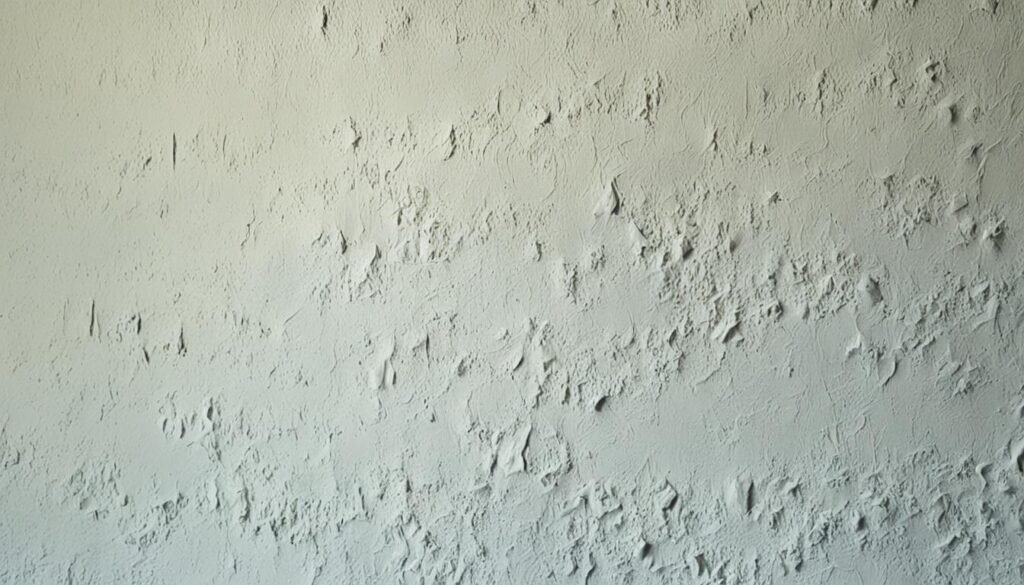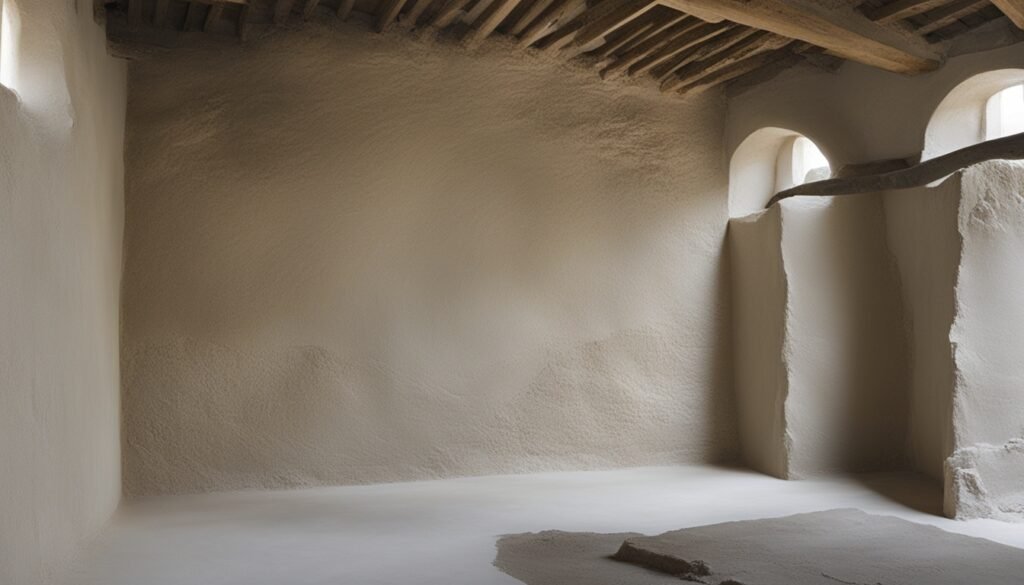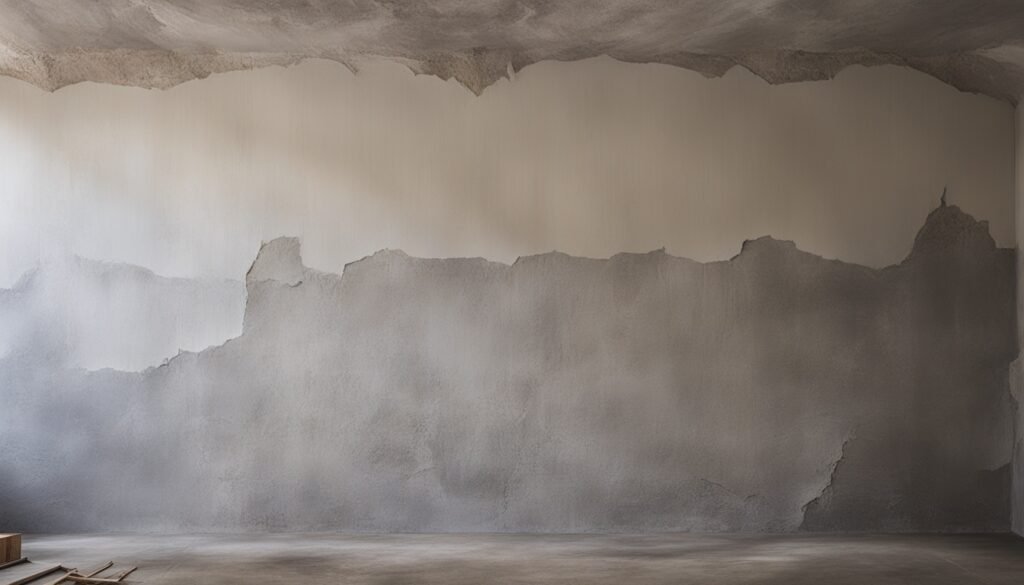Plaster drying time is key when plastering your home. You must wait for the plaster to dry fully before doing any decorative work. It usually takes 3-5 days to dry completely, but some jobs might take up to 4 weeks.
Once dry, the plaster looks pale pink and any brown spots are gone. If you don’t let the plaster dry enough, the final look might not be good. So, it’s important to wait the right amount of time before painting.
Knowing how plaster cures and what affects drying time is vital for a good plaster job. By understanding drying times and taking the right steps, you can get a top-quality finish for your home.
Factors Affecting Plaster Drying Time
Plaster drying time is key in plastering. It affects the project’s timeline. Many things can change how fast plaster dries. Let’s look at what affects plaster drying time.
Number of Plaster Layers
How many plaster layers you use matters. More layers mean longer drying times. A single coat might dry in 3-4 hours. But, multiple layers could take up to 4 weeks.
Plaster Thickness
How thick each layer of plaster is also important. Thicker layers dry slower than thinner ones. Make sure to apply plaster at the right thickness for best drying times.
Backing Material
The surface plaster is on can change drying times too. Plasterboard absorbs moisture, helping plaster dry faster. But, solid brick can make plaster dry slower.
Room Humidity
Humidity in the room affects drying times. High humidity slows down evaporation. Using ventilation or dehumidifiers can help plaster dry faster.
Weather and Temperature
Weather and temperature matter too. Warm, dry places help plaster dry quicker. Cold, damp, or humid conditions slow it down.
Type of Plaster Used
Different plaster types dry at different rates. Some dry in 3-4 hours, while others are ready for finishing in 2 hours. Knowing your plaster’s drying time is key for planning.
Keep these factors in mind to guess plaster drying times better. This helps plan your project well and finish on time.
Typical Drying Times by Job Type
The drying time for plastering changes a lot based on the job type. With the right humidity and temperature, you can expect these drying times:
- Small patchwork and repairs – 1 week
- Plaster on plasterboard for whole walls – 2 weeks
- Multiple layers of plaster per wall – up to 4 weeks
But, plastering in the cold, wet season can make it take twice as long to dry. Things like how thick the plaster is, the wall material, and the weather affect how long it takes for plaster to dry.
| Plaster Type | Typical Drying Time |
|---|---|
| Plaster with no lime | 2-4 weeks |
| Stucco base layer | 10 hours |
| Wet lime plaster | 24 hours |
| Dry plaster | 36-48 hours |
| Concrete plaster | At least 7 days |
It’s key to follow the maker’s instructions for the best plaster curing process. Doing so ensures your plaster dries well and is ready for painting or more finishing work.

Drying Times for Different Plaster Types
When plastering, the plaster type affects drying time. It’s key to know how different plasters dry to make plastering work well. Here are the typical drying times for various plaster types:
- One Coat Plaster – 3 to 4 hours to dry
- Browning Plaster – 2 hours to dry
- Bonding Plaster – 2 hours to dry
- Hardwall Plaster – 1.5 to 2 hours to dry
- Multi-Finish Plaster – 1 to 1.5 hours to dry
- Board Finish Plaster – 1 to 1.5 hours to dry
- Thistle Multi Finish Plaster – 2 hours to dry
These drying times are just estimates. They can change based on plaster drying conditions, plastering moisture levels, and plaster drying techniques. Things like ventilation, temperature, and humidity affect drying too.
| Plaster Type | Drying Time |
|---|---|
| One Coat Plaster | 3 to 4 hours |
| Browning Plaster | 2 hours |
| Bonding Plaster | 2 hours |
| Hardwall Plaster | 1.5 to 2 hours |
| Multi-Finish Plaster | 1 to 1.5 hours |
| Board Finish Plaster | 1 to 1.5 hours |
| Thistle Multi Finish Plaster | 2 hours |
Knowing how different plasters dry helps you plan plastering projects better. It ensures a smooth and successful finish. Remember, the right plaster drying conditions, plastering moisture levels, and plaster drying techniques are key for great results.

How Long Does Plastering Take To Dry
Plastering takes time to dry, which is key to know. The plastering process is slow, and you must wait for the plaster to dry fully before doing more work. How long plaster takes to dry depends on layers, thickness, humidity, and plaster type.
Usually, plaster dries in three to five days. But sometimes, it can take up to two weeks. It needs the right humidity, between 60-70%, to dry right. Too little humidity can cause cracks, and too much can lead to dampness and mold.
The room’s temperature is also important. The best temperature for plaster drying is 18 to 25 degrees Celsius. If it gets too cold, plaster may not dry well, causing problems.
- Freshly plastered walls can take up to 4 weeks to dry.
- Small repairs dry in 1 week, but multiple layers can take up to 4 weeks.
- Different plaster types dry at different times: one coat plaster dries in 3-4 hours, bonding plaster in 2 hours, and hardwall plaster in 1.5-2 hours.
Wait for the plaster to dry fully before painting or decorating. Painting wet plaster can cause uneven color, peeling, and damage. For a good plastering job, hire a pro plasterer who knows how to make sure it dries right.
Preparing Plaster for Painting
After your plastered walls dry and cure, get them ready for painting. This step is key for a perfect paint job that lasts. It involves a few important tasks.
Sanding Down Imperfections
Begin by sanding any uneven spots or imperfections with 180-grit sandpaper. This makes the surface smooth and even. It’s now ready for painting.
Sealing the Plaster
Sealing the plaster is crucial to avoid paint peeling. Use a mist coat, which is paint mixed with water. Aim for three parts paint to one part water for a thin layer.
Wait 24 hours for the mist coat to dry before painting over it. This step makes sure the seal is fully set and sticks well to the plaster.
Applying a Mist Coat
Be careful with the mist coat to avoid drips or splatters. A roller can give a smooth look but might cause splatters. Or, use a brush for better control, though it takes longer.
The mist coat prepares the plaster for the final paint. It ensures the paint sticks well and doesn’t peel or blister. Proper plaster preparation means a beautiful, lasting paint job.
Conclusion
Waiting for plaster to dry can be frustrating. But it’s key for a top-notch finish. Plastering is vital in many projects. Knowing how long it takes to dry is important to avoid problems like damp spots, mold, and painting issues.
The time plaster takes to dry changes a lot. It depends on the plaster type, how many coats you apply, the thickness, and the weather. Generally, wait at least a week before painting over fresh plaster. Sometimes, you might need to wait longer, especially in damp or cold weather.
Being patient and letting plaster cure well is important. This way, your project will look great and last longer. Remember, good plastering comes from proper prep and drying. So, take your time to get it right.

